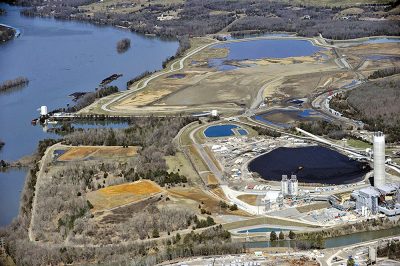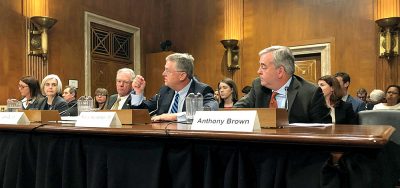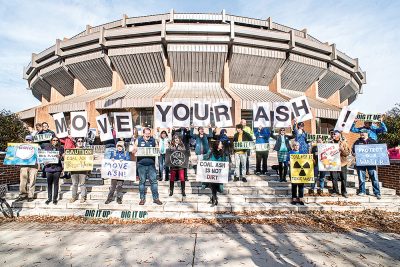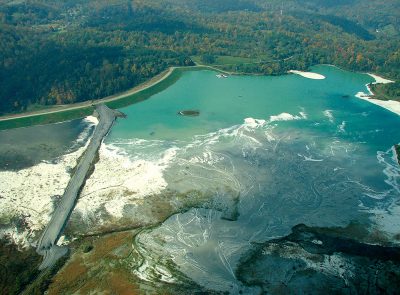Kevin Ridder | June 7, 2018 | No Comments
By Kevin Ridder

Coal ash ponds at the Tennessee Valley Authority’s Gallatin Fossil Plant on the banks of the Cumberland River. A federal judge ordered TVA to move its coal ash to a lined landfill after internal TVA documents revealed decades of leaks and pollution. Photo by Nancy Pierce/Southern Environmental Law Center, Flight by Southwings
EPA Administrator Scott Pruitt stated in a press release that the proposed changes would allow states to “incorporate flexibilities into their coal ash permit programs,” and the EPA estimated that the proposed changes would save utilities up to $100 million a year in compliance costs. But Lisa Evans, senior administrative counsel with nonprofit law firm Earthjustice, says the proposed change “follows directly the request of industry.”
A public comment submitted by Earthjustice on behalf of itself and 18 other organizations points out the most dangerous portions of the rollback, which includes allowing states — and potentially the owners of coal ash sites — to set their own “alternative” standards for groundwater contaminant levels. This could lead to states or utilities setting artificially lenient standards to avoid remediation.
Additionally, Earthjustice’s comments noted the rollback could allow coal ash ponds that don’t meet federal stability standards to remain open and would remove the requirement for plant operators to take immediate action to stop a spill, should one occur. The changes could also remove the 2015 requirement preventing coal ash storage near “drinking water aquifers, in wetlands, fault areas, seismic impact zones and unstable areas.”
Once a coal ash dump is closed, according to Earthjustice, states could allow the dump’s owner to monitor nearby groundwater for five years instead of the 30 years that the 2015 rule requires.
Staff from nonprofit organization Appalachian Voices — the publisher of this newspaper — shared testimony from Belmont, N.C., resident Amy Brown and several others who were unable to travel to the nation’s capital on a Tuesday morning.
“With the decisions that Scott Pruitt has made or is considering making, I’m left wondering if he or anyone else at the agency knows anything about the nightmare that we have been through,” Brown’s testimony read. “Our well water was tested in February 2015 because of how close we live to these open coal ash dump pits containing cancer-causing waste. The results showed that my water wasn’t safe to drink, and it was recommended that I not use it. My family relied on bottled water for 1,097 days, until finally I was hooked up to city water last Thursday.”
The United States produces 140 million tons of coal ash every year, according to the Sierra Club, a national nonprofit environmental organization. Utilities commonly store the material on-site in dry landfills or mixed with water in massive sludge ponds that can be hundreds of acres in size. Most of these storage pits are unlined, meaning toxins like lead, arsenic and mercury could seep into groundwater.
The 2015 coal ash rule required power plant owners across the country to begin drilling wells on-site near their dumping grounds to see if groundwater was being affected. The owners submitted their first reports this March.
After reviewing data for roughly 100 coal ash sites, the Sierra Club and partners found “unsafe levels of arsenic, cobalt, lithium and sulfate at most sites and unsafe levels of radioactivity at one in five sites,” according to a May blog post. The EPA’s rollback proposed removing the requirement for utilities to release this data to the public.
Duke Energy, the Tennessee Valley Authority, Dominion Energy and American Electric Power — owner of Appalachian Power — were among the utilities who reported groundwater contamination at on-site monitoring wells, according to the Associated Press.
The news organization reported that a general consensus among power company executives was that further studies were needed to see if the coal ash basins are indeed the cause of the groundwater contamination and if drinking water supplies are at risk.
To close coal ash dumping grounds, utilities often prefer to employ the cheaper “cap-in-place” method — essentially leaving the coal ash where it is with an earthen cap and thin, synthetic liner on top intended to prevent rainwater from seeping in. However, coal ash contaminants can still leach into the groundwater, and some coal ash ponds sit below the groundwater table — greatly increasing the risk of contamination.
“It’s not a closed system,” Duke University professor and coal ash researcher Avner Vengosh told Blue Ridge Public Radio in March. “It’s an open system. For people living next to coal ash ponds, there is a potential of this contaminated groundwater to flow towards drinking water wells. So we have now a potential of groundwater flow. It could take decades, it could take years, it could be tomorrow when [that] contaminated groundwater would arrive in drinking water wells.”
Many environmental groups, including Appalachian Voices, advocate instead for moving the ash to dry, lined storage away from waterways, an option that is much more expensive. Another option is recycling coal ash for use in concrete — however, air pollution from reprocessing the coal ash into a suitable material is a concern for communities.

Southern Environmental Law Center Senior Attorney Frank Holleman, second from right, testifies before a U.S. Senate committee in April on why the federal Clean Water Act should continue to protect waterways from industrial groundwater pollution like coal ash. “The polluters well know that, if this pollution is left to the state agencies alone, the polluters will get off the hook,” Holleman stated. Photo by Alexa Williams/Southern Environmental Law Center
Lisa Evans with Earthjustice says the rollbacks are “reckless and unconscionable.”
“This is a time where the EPA should examine the current coal ash rule and strengthen it, based on the evidence that the sites are leaking and endangering nearby communities,” says Evans. “There’s no legal basis that justifies the significant rollback that Pruitt is attempting. As a result, when the final rule is issued, we will contest it in court.”
Putting states back in charge of coal ash management is dangerous, according to Frank Holleman, senior attorney with nonprofit law firm Southern Environmental Law Center. “The entire reason we have a national coal ash rule is that the state agencies failed to protect us from disasters like TVA’s Kingston spill and Duke Energy’s Dan River disaster,” said Holleman in a press release.
On March 30, Virginia Gov. Ralph Northam extended the state’s year-long moratorium on coal ash basin closures until July 2019. The moratorium was intended to persuade utilities to pursue closure methods other than cap-in-place.
“This gives the state and Dominion another year to reach an agreement over how to most effectively clean up their coal ash sites,” says Sierra Club Virginia Chapter Director Kate Addleson. “But it doesn’t yet require them to do anything like clean closure, which would essentially move all the coal ash residue to lined, capped landfills far away from any of our bodies of water. The bill also gave Virginia a start on recycling coal ash with a pilot program.”
Nate Benforado, an attorney with the Southern Environmental Law Center, says while he’s “happy that there’s another delay, it does seem time to come to resolution of this issue so we can actually see progress being made.”
Benforado says that “Dominion has never shown whether cap-in-place will actually work at these sites.” Experts brought in by SELC to analyze Dominion’s own data concluded that the unlined pits are already polluting water supplies and would leak for decades if they are simply capped.
In addition to the moratorium, Virginia’s Department of Environmental Quality urged EPA Administrator Pruitt not to weaken the 2015 coal ash rule.

The Sierra Club’s Virginia Chapter co-hosted a December 2017 rally in Richmond, Va., to tell Dominion Energy to move their coal ash out of unlined pits. Photo by Adrienne Eichner
In a press release, Gov. Northam stated Virginia’s “ability to enforce these fair and strong standards will be much greater if EPA maintains its commitment to them.”
According to Benforado, it’s a good sign that Virginia wants to keep these “minimum standards” in place — but there is still a lot of work to be done. “We weren’t necessarily doing the best job enforcing the laws on the books even before these attempted rollbacks,” he says.
If the federal rule is rolled back, Benforado says, a future state administration may weaken the state’s safeguards.
In 2008, coal ash gained national attention when a dike restraining more than 1 billion gallons of the toxic sludge near Tennessee Valley Authority’s Kingston Fossil Plant burst, damaging dozens of homes and clogging the Clinch and Emory rivers.
After the 2015 federal coal ash rule was passed, the Tennessee Department of Environment and Conservation ordered TVA to investigate, assess and remediate all of the state’s coal ash sites — a move that the agency said went further than the federal law.
According to TDEC spokesperson Kim Schofinski, it is unclear the extent to which a rollback of the federal coal ash rule would affect cleanup in Tennessee.
“While we do not anticipate federal law changes affecting the order or coal ash corrective action in Tennessee, which are currently subject to existing state law, it would be premature for us to speculate on the impacts of potential federal rule changes,” Schofinski wrote in an email.
After the 2009 coal ash spill, TVA began dewatering its older coal ash ponds and capping them in place, as well as storing new coal ash in dry, lined landfills instead of wet impoundments. The utility projects all wet coal ash sites will be closed by 2022.
TVA told the USA Today Network-Tennessee in March that the proposed federal rule changes “would have no immediate impact” on this process.
The old, unlined coal ash dumps at TVA’s Gallatin Fossil Plant on the banks of the Cumberland River, however, will need to meet a higher standard. In August 2017, TVA was ordered by a federal judge to move more than 13 million cubic yards of coal ash from the ponds to a lined landfill due to Clean Water Act violations. The utility appealed the decision, arguing that the cost and potential pollution from moving the ash were too great.
Cleanup of the Gallatin site — which under the 2015 federal coal ash rule was supposed to take place as soon as possible following Nov. 1, 2018 — has been pushed to Nov. 1, 2020 due to Pruitt’s rollback. TVA must still complete the cleanup by the end of 2023.
In early 2017, Kentucky put forward a plan that would have allowed utilities to self-regulate coal ash storage and disposal, with little public input. Franklin Circuit Court Judge Phillip Shepherd overturned the plan in January 2018, stating that the changes “are not supported by any rational basis or substantial evidence,” according to the Louisville Courier Journal.

As part of a settlement with citizen groups in 2014, American Electric Power paid nearly $100,000 and agreed to bring water pollution levels from this coal ash pond in Winfield, W.Va., back within legal levels. Photo by Vivian Stockman/Ohio Valley Environmental Coalition, Flight by Southwings
The state of West Virginia has not yet adopted the federal coal ash rule, a West Virginia Department of Environmental Protection spokesperson noted. Instead, the agency regulates coal ash and monitors groundwater for the state’s impoundments under a state solid waste management rule. Regardless, Lisa Evans with Earthjustice says, “the companies still have to comply with the federal requirements.”
In a public comment to the EPA, Vivian Stockman with nonprofit organization Ohio Valley Environmental Coalition lambasted the agency’s proposed rollbacks.
“In West Virginia, we have seen time and again that polluters will skimp or pass on cleanup efforts when regulators look the other way,” the comment reads. “If enacted, EPA’s proposal to gut cleanup requirements would mean polluters could avoid cleanup, and that would mean continuing water contamination.”
In February 2014, a Duke Energy coal ash pond in Eden, N.C., spilled 39,000 tons of coal ash into the Dan River, prompting the state legislature to pass the Coal Ash Management Act later that year to monitor the cleanup and closure of impoundments across the state.
At press time in late May, the state Department of Environmental Quality was drafting new rules that would more closely align with the federal standards. The impact of the EPA’s regulatory rollback on North Carolina’s revised rules is uncertain. Dave Rogers with the Sierra Club’s Beyond Coal Campaign says that the DEQ’s draft rules are “designed to work hand-in-hand” with Pruitt’s proposed weakening of the federal coal ash regulations.
“Any weakening of the federal standards, and adoption of such weakening by North Carolina, puts communities near coal ash dumps at risk,” Rogers wrote in an email.
According to Rogers, a strict EPA coal ash rule is necessary because it provides a “strong federal backstop in case anything does change at the state level as we’ve seen and experienced in North Carolina.”
Appalachian Voices’ North Carolina Field Coordinator Ridge Graham says, “Ideally, the state rules will provide DEQ the authority to protect public health and the environment and enforce their own regulations in a way that can’t be manipulated by Duke Energy’s political pressure.”
The DEQ is scheduled to submit the final draft to the state Environmental Management Commission in July, which will be followed by a 60-day public comment period.
Environmental advocate and Greensboro, N.C., resident Caroline Armijo questions the changes to the state and federal rules.
“Why do they need to be changed? I’m just concerned that most of our government action works in Duke’s favor,” Armijo says. “We don’t want the rules to be weakened in any way, because we want to clean up the community and protect our community members.”
For updates on state and federal coal ash rules, visit appvoices.org/frontporchblog
Like this content? Subscribe to The Voice email digests